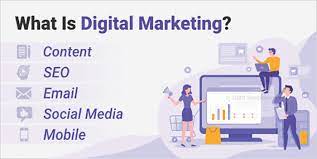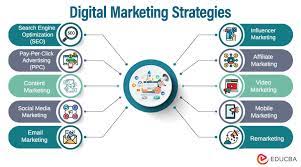Understanding Digital Marketing
Digital marketing is a strategic approach that leverages digital channels such as websites, search engines, social media, email, and mobile apps to connect with current and prospective customers. It encompasses a wide range of online tactics and techniques designed to promote products or services, build brand awareness, drive website traffic, and increase sales.
One of the key advantages of digital marketing is its ability to target specific audiences based on demographics, interests, behavior, and other factors. This targeted approach allows businesses to reach the right people at the right time with personalized messages that resonate with their needs and preferences.
Some common digital marketing strategies include:
- Search Engine Optimization (SEO): Optimizing website content to improve search engine rankings and drive organic traffic.
- Pay-Per-Click (PPC) Advertising: Running paid ads on search engines or social media platforms to attract targeted traffic.
- Social Media Marketing: Engaging with followers on social media platforms like Facebook, Twitter, Instagram, and LinkedIn to build brand loyalty and drive website traffic.
- Email Marketing: Sending personalized emails to subscribers to promote products or services, nurture leads, and build customer relationships.
- Content Marketing: Creating valuable and relevant content such as blog posts, videos, infographics, and whitepapers to attract and engage target audiences.
In addition to these strategies, digital marketing also involves analyzing data and metrics to measure the effectiveness of campaigns and make data-driven decisions for future optimization. By tracking key performance indicators (KPIs) such as website traffic, conversion rates, click-through rates, and return on investment (ROI), businesses can assess the success of their digital marketing efforts and refine their strategies accordingly.
In today’s digital age where consumers are increasingly turning to online channels for information and shopping experiences, digital marketing has become essential for businesses looking to stay competitive in the market. By understanding the principles of digital marketing and leveraging the right tools and techniques, businesses can effectively reach their target audience, drive engagement, generate leads, and ultimately achieve their marketing goals in the digital realm.
7 Essential FAQs on Digital Marketing: Strategies, SEO, Social Media, Email Tactics, and Success Metrics
- What is digital marketing?
- Why is digital marketing important for businesses?
- What are the key components of a successful digital marketing strategy?
- How does search engine optimization (SEO) fit into digital marketing?
- What social media platforms are commonly used for digital marketing?
- How can email marketing benefit a business’s digital marketing efforts?
- What metrics should businesses track to measure the success of their digital marketing campaigns?
What is digital marketing?
Digital marketing refers to the strategic use of digital channels such as websites, social media, search engines, email, and mobile apps to reach and engage with target audiences. It encompasses a wide range of online tactics and techniques aimed at promoting products or services, increasing brand awareness, driving website traffic, and ultimately achieving marketing objectives in the digital space. By leveraging the power of digital technologies and data-driven strategies, businesses can connect with customers in a more personalized and targeted manner, leading to improved customer engagement, increased conversions, and overall business growth.
Why is digital marketing important for businesses?
Digital marketing is crucial for businesses in today’s digital age because it offers a cost-effective and efficient way to reach and engage with target audiences. By leveraging digital channels such as websites, social media, email, and search engines, businesses can increase brand visibility, drive website traffic, generate leads, and ultimately boost sales. Digital marketing also allows businesses to target specific demographics and interests, track campaign performance in real-time, and make data-driven decisions for continuous optimization. In a competitive market where consumers are increasingly turning to online platforms for information and shopping experiences, having a strong digital marketing strategy is essential for businesses to stay relevant, competitive, and successful in reaching their marketing goals.
What are the key components of a successful digital marketing strategy?
A successful digital marketing strategy consists of several key components that work together to achieve specific goals and objectives. These components include a well-defined target audience, engaging and relevant content, effective use of digital channels such as social media and email, search engine optimization (SEO) to improve visibility and organic traffic, pay-per-click (PPC) advertising for targeted campaigns, data-driven analytics to measure performance and make informed decisions, and ongoing optimization based on insights gained from analysis. By integrating these components cohesively and strategically, businesses can create a comprehensive digital marketing strategy that drives engagement, builds brand awareness, generates leads, and ultimately boosts conversion rates for long-term success in the online landscape.
How does search engine optimization (SEO) fit into digital marketing?
Search engine optimization (SEO) plays a crucial role in digital marketing by enhancing a website’s visibility and ranking on search engine results pages. By optimizing website content, keywords, meta tags, and other elements according to search engine algorithms, businesses can improve their organic search rankings and attract more targeted traffic to their site. SEO helps businesses increase their online presence, drive quality leads, and enhance brand credibility in the competitive digital landscape. When integrated strategically into a comprehensive digital marketing strategy, SEO can significantly boost a business’s online visibility and overall marketing performance.
What social media platforms are commonly used for digital marketing?
In digital marketing, several social media platforms are commonly used to reach and engage with target audiences effectively. Some of the most popular platforms include Facebook, Instagram, Twitter, LinkedIn, and YouTube. Facebook is widely used for its diverse user base and robust advertising options. Instagram is known for its visual appeal and influencer marketing opportunities. Twitter is popular for real-time engagement and customer service. LinkedIn is a valuable platform for B2B marketing and professional networking. YouTube offers video marketing opportunities to showcase products or services creatively. By leveraging these social media platforms strategically, businesses can connect with their audience, build brand awareness, drive website traffic, and ultimately achieve their digital marketing goals.
How can email marketing benefit a business’s digital marketing efforts?
Email marketing can significantly benefit a business’s digital marketing efforts by providing a direct and personalized way to engage with customers. Through targeted email campaigns, businesses can deliver relevant content, promotions, and updates to their subscribers, nurturing relationships and driving customer loyalty. Email marketing also allows businesses to segment their audience based on demographics, behavior, or interests, ensuring that the right message reaches the right people at the right time. Additionally, email marketing is a cost-effective strategy that can yield high returns on investment when executed strategically, making it an essential tool for businesses looking to drive website traffic, increase sales, and build brand awareness in the digital landscape.
What metrics should businesses track to measure the success of their digital marketing campaigns?
Businesses should track a variety of metrics to measure the success of their digital marketing campaigns. Some key metrics include website traffic, conversion rates, click-through rates, cost per acquisition (CPA), return on investment (ROI), customer lifetime value (CLV), and social media engagement. These metrics provide valuable insights into the effectiveness of digital marketing efforts, allowing businesses to assess campaign performance, identify areas for improvement, and make data-driven decisions for future optimization. By monitoring and analyzing these metrics regularly, businesses can gauge the impact of their digital marketing strategies and ensure they are on track to achieve their marketing goals.




